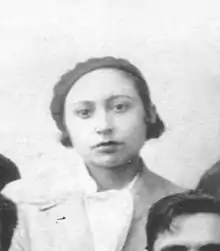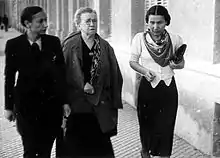Lucía Sánchez Saornil
Lucía Sánchez Saornil (Madrid, 13 December 1895 – Valencia, 2 June 1970), was a Spanish poet, militant anarchist and feminist. She is best known as one of the founders of Mujeres Libres and served in the Confederación Nacional del Trabajo (CNT) and Solidaridad Internacional Antifascista (SIA).
Lucía Sánchez Saornil | |
|---|---|
 Lucía Sánchez Saornil in 1933 | |
| Born | 13 December 1895 Madrid, Spain |
| Died | 2 June 1970 (aged 74) Valencia, Spain |
Early life
Lucía Sánchez Saornil was born December 13, 1895, in Madrid, Spain. Her parents were Eugenio Sánchez and Gabriela Saornil. Her mother died when she was young and Sánchez Saornil was left with her impoverished father and younger sister. Unlike the majority of Spanish women at the time, Sánchez Saornil was educated and she attended the Royal Academy of Fine Arts of San Fernando.
Poetry and Writing
Lucia wrote under the male pen name Luciano de San Saor.[1] This pseudonym allowed her to obtain credibility in a male-dominated realm, and also allowed her to explore homosexual themes without restraint or censorship .
She was involved in the Ultraist movement and in the Spanish avant-garde, both male dominated genres. By 1919 she had been published in several journals, including Los Quijotes, Tableros, Plural, Manantial and La Gaceta Literaria. Despite being a prominent figure in her time, Lucia’s work is still missing from modern discussions on poetry of her day. -Fearless women of the Mexican Revolution and the Spanish Civil War- Chapter: Death stories
Sánchez Saornil also wrote about women in the Spanish Civil War. She poetically described their experiences as women in wartime. These writings stand out against other literature written about men in the Spanish Civil War.
Writing in anarchist publications such as Earth and Freedom, the White Magazine and Workers' Solidarity, Sánchez Saornil outlined her perspective as a feminist. Although quiet on the subject of birth control, she attacked the essentialism of gender roles in Spanish society. In this way, Lucía established herself as one of the most radical of voices among anarchist women, rejecting the ideal of female domesticity which remained largely unquestioned. In a series of articles for Workers' Solidarity, she boldly refuted Gregorio Marañón's identification of motherhood as the nucleus of female identity.
Political activism and the Spanish Civil War
During the Spanish Civil War, women were mobilized on many fronts. Sanchez Saornil was a leader on many fronts as well.
She was an anarchist. Today she is considered to be an anarcho-feminist. However, she did not consider herself a feminist. The concept of feminism was associated with the upper-class. Therefore, working class women who aligned themselves with the class struggle did not embrace feminism. However, many of the ideals they did embrace would be considered feminist by today’s standards Many of her peers shared this view.[2]
In the 1920s, Sánchez Saornil began to affiliate herself with the anarcho-syndicalist movement. Having been a telephone operator since 1916, she participated in a labor strike in 1931. This social activism led to her being let go from the Telefónica company, and she moved from Valencia to Madrid where she soon became affiliated with the Confederación Nacional del Trabajo (CNT).
Lucia was a member of the Confederación Nacional del Trabajo (CNT) or the National Confederation of Labor. In 1933, Lucía was appointed Writing Secretary for the CNT of Madrid, producing their journal in the run up to the Spanish Civil War. In May 1938, she became the General Secretary of the Solidaridad Internacional Antifascista (SIA), an anarchist aid organization similar to the Red Cross. Though anarchism and feminism tended to develop side-by-side, Sanchez Saornil found sexism in the CNT. The CNT denied the need for a separate women’s organization, but Sánchez Saornil co-founded the organization Mujeres Libres to address the needs of women.
It is important to note that the CNT appears to be sympathetic to women’s emancipation, in comparison to the Socialist party of Spain, the Communist Party of Spain, or the Labor/Anarchist Federation of Iberia.
Sánchez Saornil was involved with Emma Goldman, a notable anarchist. Emma Goldman corresponded with Sanchez Saornil and assisted anarchist causes in the Mujeres Libres organization. Goldman’s agenda aligned in many aspects with the agenda of Mujeres Libres.[3]
Sánchez Saornil advocated for free love. A lesbian herself, she made little to no effort to hide her relationship with her lifelong partner América Barrosa, whom she met in 1937 while working in Valencia as the editor of the journal Threshold.
Mujeres Libres

Mujeres Libres Means “Free Women”
Mujeres Libres was founded in 1936 by Sanchez Saornil and two other women: Mercedes Comaposada and Amparo Poch. The Mujeres Libres organization was an offshoot of the CNT, hoping to address women’s issues and sexism within the chauvinistic anarchist movement. It focused on the "double struggle" of women's liberation and social revolution. Mujeres Libres published a magazine as a part of their movement. The three founders also worked as editors, desiring to share their education with all women. In total, there were 14 editions of the magazine published. At its height during the Spanish Civil War, the organization had 30,000 members.
Goals of the organization
The organization attempted to focus on women's liberation and emancipation. Many believed that women's freedom would arise from a classless society, but Mujeres Libres disagreed. It focused on women's sexual freedom, but with some restraint. Women's sexual freedom was seen as a private individual matter, not one for the public or the state. Therefore, programs were limited. Mujeres Libres did not focus as much on lesbianism, love, or abortion, as these were less practical and more associated with the feminist movement, which Mujeres Libres distanced themselves from.[4]
Impact of the organization
The organization worked to educate women and children. Spain still had low literacy rates in this part of the century. Mujeres Libres endeavored to educate women in order to give them power. In this education, anarchist teachings were also very present. Mujeres Libres also helped educate children, supporting schools in rural Spain, especially in Andalucía. Daycare programs were also established, helping women to balance work and family.
Mujeres Libres instructed women on the importance of birth control. The aim was to allow women to have children when they chose to. In this era, women were often expected to work at a factory or similar job, as well as care for a household and children. Birth control allowed women to determine the direction they wanted their life to go. Mujeres Libres also held anti-prostitution drives.[5]
Exile and hiding
With the defeat of the Second Republic, Sánchez Saornil and her partner América Barrosa were forced to flee to Paris, where Sánchez Saornil continued her involvement in the SIA. With the fall of France to German forces, it was soon necessary for them to move again and they returned to Madrid in 1941 or 1942. Her exile and return are still somewhat mysterious. [4]
In Madrid, Sánchez Saornil worked as a photo editor but quickly had to relocate again after being recognized as an anarchist partisan. She and América moved to Valencia where América had family. Due to the rise of fascism and Catholic moralism, their lesbian relationship now put them at significant personal danger and was maintained in secrecy. Sánchez Saornil was also unable to be politically active in Francoist Spain. During this time, América worked in the Argentine consulate while Lucía continued her work as an editor until her death from breast cancer in 1970. Her poetry demonstrates her mixed outlook, embracing both the pain of defeat and the affirmation of struggle. She left behind no memoir.
Lucía's tombstone epitaph in the General Cemetery of Valencia reads, "But is it true that hope has died?" ("¿Pero es verdad que la esperanza ha muerto?").
See also
References
- Kowal, Donna M. (2019), Levy, Carl; Adams, Matthew S. (eds.), "Anarcha-Feminism", The Palgrave Handbook of Anarchism, Cham: Springer International Publishing, pp. 265–279, doi:10.1007/978-3-319-75620-2_15, ISBN 978-3-319-75620-2, retrieved 2020-10-09
- Tabea Alexa, Linhard (2005). Fearless Women in the Mexican Revolution and the Spanish Civil War. Columbia Missouri: Columbia, Missouri: University of Missouri Press. pp. 23–57.
- Kaymakçioğlu, Göksu (2010). “STRONG WE MAKE EACH OTHER”: EMMA GOLDMAN, THE AMERICAN AIDE TO MUJERES LIBRES DURING THE SPANISH CIVIL WAR, 1936-1939. THE DEPARTMENT OF HISTORY BĠLKENT UNIVERSITY ANKARA.
- Acklesberg, Martha (1991). Free Women of Spain: Anarchism and the Struggle for the Emancipation of Women. Indiana: Indiana University Press.
- Mintz, Franm (2013). "Organizing Self-Management Across the Nation". Anarchism and Workers' Self-Management in Revolutionary Spain: 107–121.
Books
- Ackelsberg, Martha A. Free Women of Spain: Anarchism and the Struggle for the Emancipation of Women. Bloomington, IN: Indiana University Press, 1991.
- Cimbalo, Michela. Ho sempre detto noi. Lucía Sánchez Saornil, femminista e anarchica nella Spagna della Guerra Civile. Roma, Viella, 2020.
- Enders and Radcliff. Constructing Spanish womanhood: female identity in modern Spain. SUNY Press, 1999.
- Linhard, Tabea Alexa. Fearless women in the Mexican Revolution and the Spanish Civil War. University of Missouri Press, 2005.
- Nash, Mary. Defying Male Civilization: Women in the Spanish Civil War. Denver, CO.: Arden Press, 1995.
Articles
- Lucía Sánchez Saornil: La vanguardista. El Mundo (10 May 1998)
- Gimeno, Luz Sanfeliu. Lucía Sánchez Saornil; una vida y una obra alternativas a la sociedad de su tiempo.
- "The Question of Feminism" by Lucia Sanchez Saornil